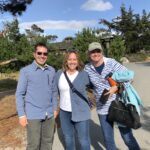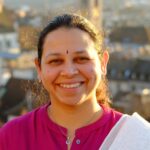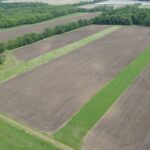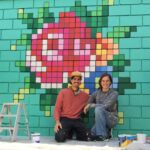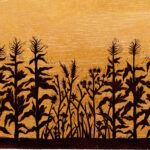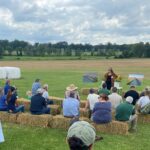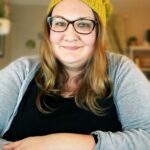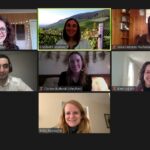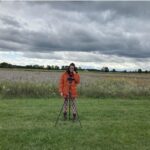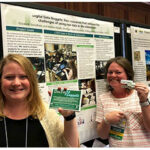Britney Christensen, Gabe Knowles, and Connie High joined the KBS community through the NSF LTER RET Program (National Science Foundation’s Research Experience for Teachers). This program matches K-12 teachers with local scientists with the goal of enhancing the professional development of K-12 science educators through research experience in order to then bring new knowledge into their classroom. Their experience culminated with a visit to Asilomar, California to attend the LTER Network's All Scientists Meeting in 2022. The following post is written by Britney, Gabe, and Connie, along
Joelyn de Lima: Visiting home
Joelyn de Lima is a recent graduate from MSU, working with Dr. Tammy Long in the Department of Plant Biology. She is currently based in Switzerland, and in spring 2021 was appointed as a virtual visiting scholar with the Kellogg Biological Station Long-Term Ecological Research Program (KBS LTER). Joelyn worked with Kara Haas and the K-12 Partnership team to support and create professional development programming for teachers and Education & Outreach graduate student fellows. To get in touch with Joelyn, you can email her at delimajo@msu.edu or follow her on social media
Prairie strip and soil health farm field day to be held in Cassopolis on August 26th
CASSOPOLIS, Michigan— A farm field day centered on prairie strips and soil health will be held on Friday, August 26th (September 2nd rain date) from 1:00- 3:00 p.m. at the Edward Lowe Foundation. The field day will feature speakers including farmers, land managers, and soil scientists who will describe the implementation, management, and soil health benefits associated with on-farm prairie strips. The event is free and open to the whole family and will include a soil pit demonstration, a wagon tour of prairie strips and refreshments. This field day is supported by Michigan State
New KBS LTER Artist-in-Residence program aims to create intersection between art and research
This spring, Michigan State University launches the Farmscapes to Forests: Kellogg Biological Station (KBS) Long-Term Ecological Research (LTER) Artist-in-Residence Program, which will welcome artists from across all mediums to spend a week at the Kellogg Biological Station in Hickory Corners, Michigan, followed by a culminating visit in the fall or winter to share their work. Supported by the National Science Foundation, Gretel Van Wieren, Professor in MSU’s Department of Religious Studies, is leading the program in its first collaboration with Dream Scene Placemaking,
Prairie strip ecology, art, and advocacy in the LTER: Reflections from an LTER Fellow
Corinn Rutkoski is a graduate student in Sarah Evan's lab at the Kellogg Biological Station. She is broadly interested in the use of perennials in agricultural systems, science policy, and soil health. Her research path has been propelled by a reciprocal inspiration among ecology, conservation, and creativity. In September 2018, Lisa Schulte Moore was scheduled to give a seminar at KBS titled Prairie strips improve biodiversity and multiple ecosystem services from corn-soybean croplands. At the time, I was a technician in Sarah Evans’ lab at KBS, considering graduate school
Kellogg Biological Station joins multi-state effort to increase the adoption of prairie strips across the Midwest
Before there were the gently rolling hills of farmland and forest we see today, southwest Michigan’s landscape included large areas of prairie habitat. Dominated by wildflowers, grasses, and sedges, these habitats were maintained by periodic fires and included oak barrens, dry sand prairies, and wetland prairies. Today, only a few remnants of Michigan’s historical prairies remain on the landscape. Prairie strips, a conservation practice in row crops that protects soil and water while providing habitat for wildlife, are one way to restore these habitats to the
Insects, big data and a passion for open science launch a rewarding career
Christie Bahlai shares how her entomology research and connections made as an MSU postdoc have contributed to work honored with a National Science Foundation early-career award. Postdoctoral researchers are critical contributors to Michigan State University’s (MSU) research, bringing experience and often fresh insight. Christie Bahlai, an assistant professor at Kent State University, was recently selected for a National Science Foundation (NSF) early-career award. Bahlai, a computational ecologist, earned degrees at the University of Guelph before joining University Distinguished
Science on the Hill: connecting research to policy through virtual Congressional meetings
Corinn Rutkoski and Ekrem Ozlu share their experiences from a recent Congressional Visit Day where they advocated for several USDA research programs. Corinn is a graduate student in Sarah Evans's lab and studies microbial ecology and the use of perennials in agricultural systems. Ekrem is a postdoctoral researcher in Phil Robertson's lab and studies soil management and carbon sequestration. The Soil Science Society of America (SSSA) recently hosted their annual Congressional Visits Day, giving a group of KBS scientists and students an opportunity to connect with elected officials and
Bridging the gap between our community and science with Film
Michaela Rose works as a Laboratory Technician in the Haddad lab at MSU's Kellogg Biological Station, and studied Zoology and Film Studies at North Carolina State University. She recently produced a series of films capturing the ecology and research of the KBS LTER. All of Michaela's videos can be viewed on the Kellogg Biological Station YouTube page! Although there are many media forms where we consume information on the daily, film remains one of the most influential. Short snippets or stories on social media platforms such as Twitter, Youtube, and Instagram are viewed by
Data Nuggets researchers lead collaborative study examining representation in STEM curriculum
When you were a child, what was your image of a scientist? Could you imagine yourself in those shoes? A new, National Science Foundation-funded study led by Michigan State University researchers and others aims to better understand how science instruction that contains diverse scientist role models affects student attitudes about science, technology, engineering and mathematics—STEM—courses and careers. Data Nuggets, a project that has created free STEM classroom activities since 2011, is integral to the new study. Data Nuggets was founded by postdoctoral
- « Previous Page
- 1
- 2
- 3
- 4
- …
- 10
- Next Page »
